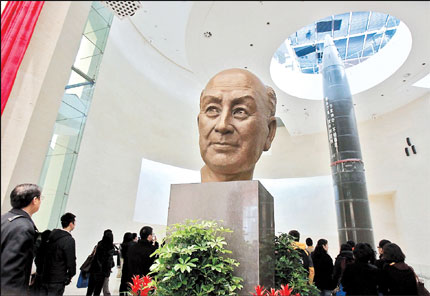Museum for father of China's space program
 0 Comment(s)
0 Comment(s) Print
Print E-mail
Shanghai Daily, December 9, 2011
E-mail
Shanghai Daily, December 9, 2011
The Qian Xuesen Library and Museum will be opened to the public starting this Sunday to mark the 100th anniversary of the birth of the father of China's space program.
 |
|
The Qian Xuesen Library and Museum, honoring the father of China's space program, is set to open to the public six days a week, starting this Sunday. |
The museum at Shanghai Jiao Tong University, where Qian studied, has the most comprehensive collection of his works. Qian, also known as Hsue-shen Tsien, died in October 2009 at the age of 97. He led the country's missile and aviation programs and played a significant role in developing China's first man-made Earth satellite.
The three-story museum covers 9,300 square meters and contains 84,000 pieces of documents, materials and objects in total. The museum will first display 15,000-plus pieces of materials. The objects on display include a briefcase that Qian had used for nearly four decades and many important scripts.
Qian is deemed as one of the country's greatest scientists and a patriot.
Qian graduated from Shanghai Jiao Tong University in 1934. He left for the United States after winning a scholarship to graduate school in 1935. He studied at the Massachusetts Institute of Technology in 1935 and later at the California Institute of Technology. He began his career in the US and was regarded as one of the brightest minds in the new field of aeronautics.
He is widely remembered for abandoning a rewarding life in the US and returning to then-poor China in 1955.





